By Kenton X. Chance
The 113 recruits who completed their training and joined the ranks of the Royal St. Vincent and the Grenadines Police Force (RSVGPF) on Thursday to start their two-year probation are barely enough to replace those who retired or resigned from the constabulary last year.
A well-placed source told iWitness News that with the addition of the recruits, there are still more than 80 vacancies in the police force.
Further, so far this year, more than 20 officers have either quit the force or given notice of their intention to resign this year.
Officers are resigning after serving for 10 years, by which time they are entitled to a gratuity.
Others, however, are quitting after just one or two years of service, having enlisted in the RSVGPF merely as a stepping stone on their way to other constabularies across the region or the British armed forces.
Prime Minister Ralph Gonsalves who is also minister of national security addressed this issue pointedly as he spoke at Thursday’s passing out parade.
It was the second consecutive month he was addressing the issue, having said in March that the Coast Guard Commander had complained that “one major challenge was the loss of junior, trained technical staff to foreign military forces”.
A source with knowledge of the situation told iWitness News that the police force has more than 500 constables with less than 10 years’ experience.
And while the government has said there are 1,200 officers enlisted in the RSVGPF, the officer questioned this in light of alleged severe shortages among some units.
iWitness News was reliably informed that the leadership of the police force is attempting to address the problem, with a senior police officer telling a general meeting of ranks last Tuesday, April 23, that the constabulary would be strictly enforcing the law mandating that officers give three months’ notice before resigning.
Further, police officers at the meeting at Old Montrose Police Station were told that the RSVGPF would take steps to have any of its members who join another constabulary or army while on leave from the RSVGPF, discharged from that other force and made to answer desertion charges in open court in St. Vincent and the Grenadines.
Police officers who spoke to iWitness News did so on condition of anonymity because they are not allowed to speak to the media and could face severe consequences for doing so.
They said officers are quitting because of poor pay and working conditions, apparent favouritism in promotion, and a lack of resources, including transportation.
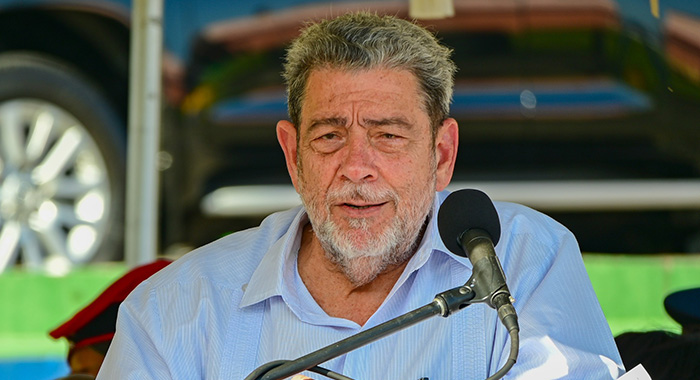
PM says some recruits abusing police force
At Thursday’s parade, Gonsalves told the recruits that he knows many of them do not plan to make a career of their enlistment.
“I know many of you have joined the police force — not most of you, but a few of you here maybe a few, not many — you joined the police force with this idea in your head, a few of you: You get your salary in training, you have a good background, the British army needs a lot of people –” Gonsalves said and some members of the crowd began to laugh.
“I know. I know. I know,” the prime minister said. “You know, I’m in the middle of this thing, you know.
“So you’re going to spend a year and a half, you have a partner up there in England and as soon as you get your application in order, you’re gone.”
Gonsalves said that in other words, the recruits “use the system, you misuse it, even abuse it”.
He said some of them have partners in Antigua, St. Kitts, Bermuda, Turks and Caicos or the British Virgin Islands.
“‘Boy, how much money you making down there?’” he said to laughter as he mimicked a presumed conversation between a Vincentian enlisted in another Caribbean force and a member of the RSVGPF.
“You tell them and you hear, especially up in the BVI and so on where they pay you in US dollars, your eyes sparkle and you think that the grass is greener on the other side,” Gonsalves further stated.
“But while you will pay a little bit of money for a breadfruit ah St. Vincent, you have to pay an arm and a leg for it up there. And while the rent might be 300 US here, EC$800, up there is US$2,000
“So before you move, you balance everything, eh,” Gonsalves said, adding that he was not saying that the recruits should not have ambition.
“But please, we train you, we spent a lot of money on you, you have to give us back something, man and woman. Please. You have to do that. You have to do that,’ he said to applause.
Constables earn more overseas than senior officers in SVG
However, one police officer told iWitness News that in one of the forces that is attracting Vincentian officers, a constable’s pay is more than that of some very senior ranks of the RSVGPF.
The officer further pointed out that in some jurisdictions, a constable can live at the barracks for up to a year, cushioning the financial impact of relocation to another country.
What’s more, after moving out of the barracks, they tend to live together with other Vincentians, including law enforcement colleagues, thereby sharing the burden of rent and related living costs.
“Sometimes, if a constable sends back (to St. Vincent) a small part of the salary they are making overseas, considering the exchange rate, they are able to save almost half of what they would have been making at home,” a police officer told iWitness News.
Meanwhile, speaking at the passing out parade, Commissioner of Police Enville Williams, told officers that they must have a “rescue plan”, should they realise that policing is not for them.
“Not very often though, you will hear from a lectern like this to have a rescue plan. If the job does not give you satisfaction, if you think that the police force is not for you, consider other lawful and legal options rather than to be burnt out,” the police chief said he gave them tips for a successful career as police officers.
Several police officers spoke to iWitness News on condition of anonymity about a general meeting held two days before the parade with serving members of the force.
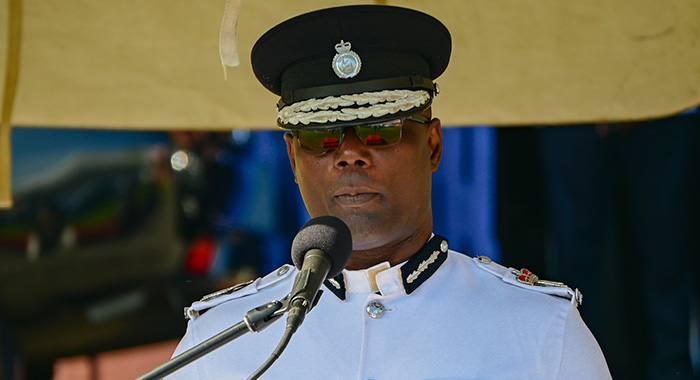
Senior ranks not addressing junior officers’ concerns
One officer told iWitness News that the meeting did not address the welfare of police officers, their living quarters or other issues affecting their performance.
“The funny thing about it, when he (senior police officer) was done talking, when he asked if anyone had anything to say, not one answered,” the officer remarked.
iWitness News was reliably informed that officers were told that the police force will not be allowing uniformed officers to wear beards even if they present a doctor’s certificate saying that they cannot shave closely.
Further, officers were reportedly told that the RSVGPF would stop giving officers no-pay leave to travel to England.
If any officer joins the British Army while on vacation, the RSVGPF would contact the UK authorities and block the enlistment and have the officer repatriated and made to answer a desertion charge in open court, RSVGPF members were reportedly told.
“He (senior officer) did not talk about the state of the Bequia, Canouan, Stubbs or Biabou police stations, all of which are in a deplorable condition, not to mention the fire stations across the country,” one officer told iWitness News.
“However, police officers are afraid to speak up because they think about the consequences and I will not make myself the sacrificial lamb,” the officer further stated.
“If you are suffering from something and you are not talking about it, it means that you are satisfied with it. I will not speak for the majority because when you are looking for support from police officers, you do not get the support.”
Memories of the vaccine mandate
The officer said that the meeting brought back memories of the pending COVID-19 vaccine mandate in 2021, under which several police officers lost their jobs.
The High Court later ruled that the government acted illegally in dismissing public sector workers who did not take the jab, and the Court of Appeal is expected to hear the government’s appeal of that decision on Thursday, May 2.
“… we had all the powers to refuse to take that vaccine or stand down. But, we never got the support because whatever they forced in our stomachs, we had to go with,” the officer told iWitness News. “I always say that once you stand up for what is right, you can’t go wrong.”

The officer was of the view that the police force “is going downhill’ with junior officers not getting support from senior ranks.
“We have to do medical to join the police force. If you fail that medical, you cannot join the police force but after you join, you get all kinds of medical complications because of the kind of stress and the kinds of things we go through in the force and the kinds of things we deal with or are dealing with,” the officer said.
“All that they are concerned about is that you get the job done. Police officers leave our good homes and go and bend up and stand up and sleep or lie done in rat-infested places. And when we get sick, they don’t want the doctors to give us sick leave.
“Police officers need to tell the media about certain things,” the officer said.
Meanwhile, another police officer told iWitness News that his colleagues are “fed up” and that is why they are resigning.
“You have to look at the root causes of the high number of resignations, especially people who are leaving to join other forces,” the officer told iWitness News.
“Police officers need better living conditions. The salaries are too small, and the working conditions are bad. If you don’t address the issue but want to implement draconian policies, people will leave,” the officer said.
“You have to put pressure on the government or whoever and tell them why police officers are leaving. If police officers are unhappy and you pressure them to remain in the force, they will undermine the system or you will not get any work done.”
Meanwhile, another police officer told iWitness News that the salaries that RSVGPF officers receive are small when compared to even other forces in the region.
“Officers are leaving because of the way they are being treated. They believe they were treated unfairly in respect of promotion. People with experience and training locally and overseas are being overlooked for promotions.”
The officer gave “a glaring example” of the policeman and policewoman of the year 2022 being overlooked for promotion.
In addition to being recognised as Policeman of the Year 2022, detective Sergeant 740 Biorn Duncan was adjudged the second-best crime fighter from 25 countries in the region, but these accolades were not enough to earn him a promotion last year.
Also, Corporal Lafleur Williams, a narcotics investigator who was declared Policewoman of the Year 2022, was overlooked for promotion after a year in which she seized four of the 35 firearms the police confiscated.
Also, Williams seized 132lbs (59.9 kgs) of cocaine, 500 grammes of cannabis and confiscated $8,200 in counterfeit U.S. notes.
PM suspects 20% of recruit will quit within 2 years
Meanwhile, Gonsalves further discussed the issue of police officers quitting the force on Sunday on WE FM’s Issue at Hand.
The prime minister said that the 113 recruits were “a big number”, adding that listeners should not be surprised if after two years, about 20% of “they’re gone to BVI, Antigua, St. Kitts, Bermuda, Turks and Caicos and increasingly into the army in the United Kingdom”.
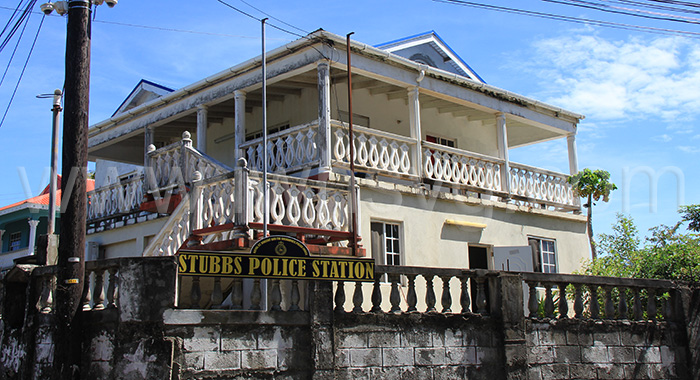
He said some of these people think their best chance of getting into the British armed forces or a police force across the region is to enlist in the RSVGPF.
“So they are paid while they are being trained for the five months, six months, whatever the time. They then set about pretty early to carry out their plan,” he said, adding that it may take a year for these officers to “formalise everything to get to the United Kingdom and all the rest of it”.
Gonsalves said that since his government came to office in March 2001, over 2,000 Vincentians have joined the armed forces in the United Kingdom.
Asked if there was still a significant number of vacancies in the police force, the prime minister said:
“Yes. You also have in addition to that, there are people who take their 10-year monies. A constable who is in for 10 years, he takes his 10 monies or you have someone, an officer who takes his 20-year monies.”
He, however, said that more people leave after 10 years because they are still young.
Asked if he saw it as an issue that merits some kind of intervention from the government, Gonsalves said:
“Well, we have been intervening and you know, the restructuring of the salary in 2007 was a major intervention.
“… the wages, the salaries for the police jumped by about 70% with that reclassification, … which was a significant jump, because they used to be recruited at the level of below a junior clerk salary,” he said.
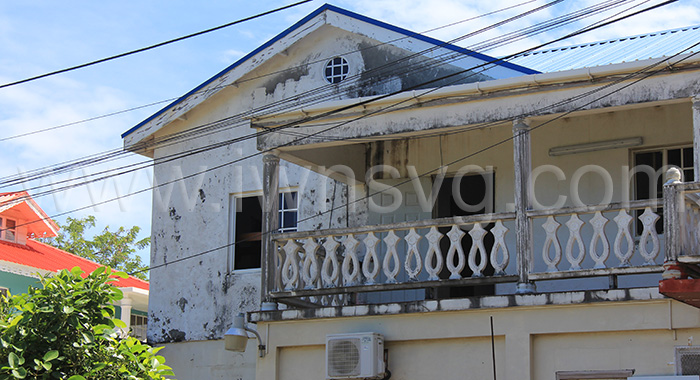
Officer calls for better equipment, including non-lethal weapons
But one police officer told iWitness News the police force was not being run professionally enough.
“Equipment and transportation are major issues,” one officer told iWitness News, adding that the Rapid Response Unit in Ottley Hall, a community which has seen several shootings since last year, has been without a vehicle for about eight months.
The vehicle got into an accident last year and is at the police garage rotting away, the officer told iWitness News.
“When they say we got five vehicles, it is like bringing in the 113 recruits — not enough to perform duties,” the officer told iWitness News.

The officer told iWitness News that the Spring Village, Rose Hall, Layou, Stubbs, and Owia police stations do not have a vehicle assigned to them.
“Owia station covers Fancy. Look at the distance between the two places,” the officer said of the two North Windward villages, which are 2.3 miles apart but over extremely steep terrain.
“If something happens where they (officers from Owia) have to go there (Fancy), they have to call Georgetown.
“How long does it take to come from Georgetown?” he said of the regional capital, which is 10 miles from Owia.
“They (senior ranks) say not to say you don’t have a vehicle, but if you are in Owia and have to go to Fancy, how are you getting there? Walk?” the officer said.
As regards equipment, the officer said, “We are in modern times. It is time for us to have non-lethal weapons such as tasers, stun guns, and pepper spray, especially when dealing with mentally challenged people.”
On April 7, police shot and killed Anthony Joseph aka “Tumba”, a mentally ill man in his
home community of McKies Hill as they responded to a report that he had attacked a relative with a knife.
iWitness News was reliably informed that Joseph was shot in the chest.
The officer also spoke out about the condition of police stations, saying many of them are in a horrible condition.

The officer said that the Stubbs, Colonarie and Spring Village police stations are located in rented premises that are “not in good condition”.
The officer is calling for the modernisation of the police force, saying that tunics and belts for uniformed officers should be a thing of the past.
“Police officers should have a well-equipped tactical belt that includes a firearm and a non-lethal weapon such as a taser or pepper spray, handcuffs, etc.,” the officer said, adding, “We need to be dressed comfortably.”
The officer expressed fear that unless something is done to address officers’ concerns, this year would be an especially bad year for the RSVGPF with regard to resignations.
“A lot of people who have a lot of experience, trained locally and overseas are leaving. Some of the top detectives and top tactical people are leaving. There are a lot, a lot of issues that have to be addressed,” the officer said.
The officer further told iWitness News that even when officers succeed in leaving the force, they are losing money from their gratuity as the government claims that they were placed too high up on the salary scale when the reclassification was done some years ago.




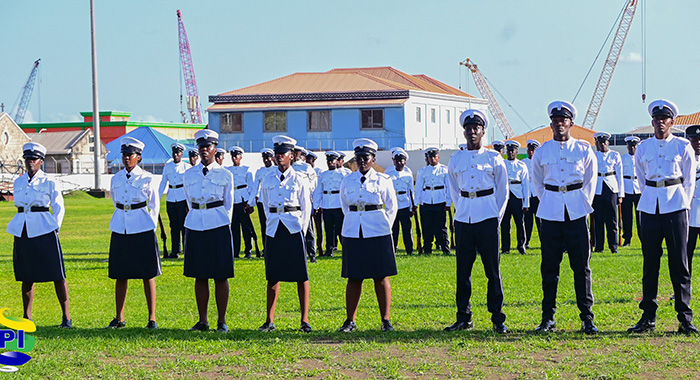


The Pm is being practical but the naysayers love to have a negative narrative…… Check book journalism
Great journalistic work